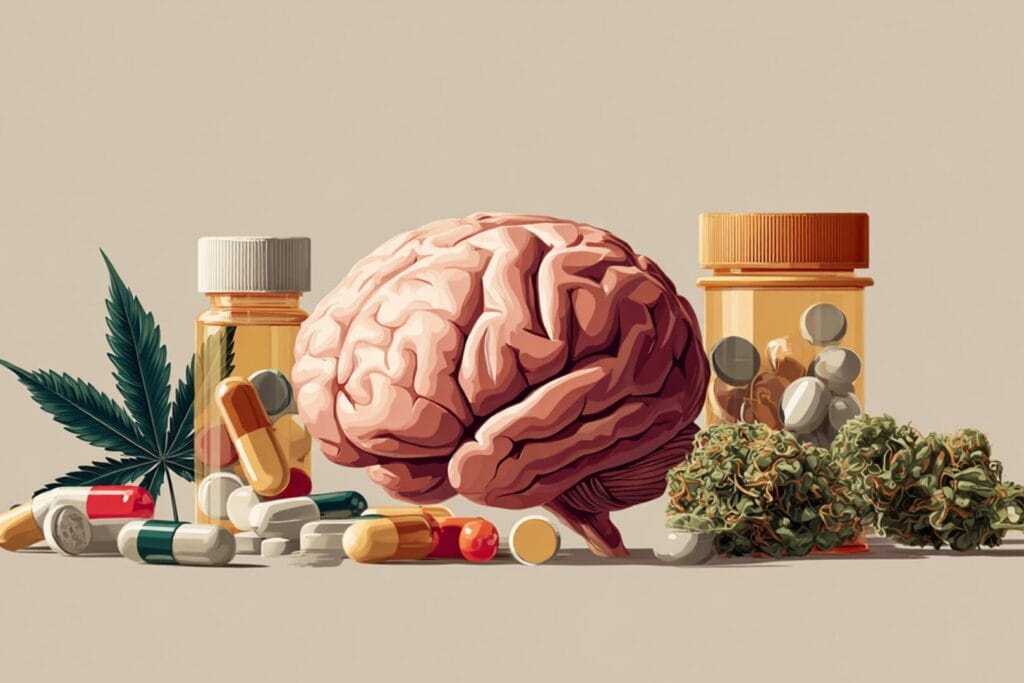Whether it’s mimosas at brunch or an afternoon beer, plenty of people enjoy day drinking. While it can seem like a casual way to socialize or relax, you might question whether it is more than an indulgence and could signify a deeper issue with alcohol.
Whether or not you have a problem with drinking or a dependency isn’t determined by the times of day you drink, however. There is a spectrum that alcohol use occurs on, and there’s a lot more to a diagnosable alcohol addiction than day drinking. At the same time, that doesn’t mean that day drinking isn’t a red flag.
Why Do People Day Drink?
The concept of day drinking has become increasingly popular on social media as brunches and other weekend activities are shared, making it seem like everyone is doing it.
People might drink during the day for many reasons, including socializing and celebrating special occasions like weddings, holidays, or birthdays. Suppose you’re doing certain recreational activities like barbecuing or going to a sports event. In that case, day drinking might be normalized, and in some cultures, it’s normal to drink during the day when it’s part of celebrating or social customs.
Day drinking can be harmless and fun for many people, but it is important to recognize that habitual or excessive drinking during the day or at any time can indicate an underlying issue.
Being mindful and honest about your drinking habits and patterns is always good.
Does Day Drinking Mean You’re an Alcoholic?
Day drinking doesn’t automatically mean you have alcohol use disorder. You have to consider a lot of factors and behaviors when determining whether alcohol is an issue. Day drinking in moderation and within social contexts or special occasions can be no problem.
It can become a problem when day drinking becomes regular and interferes with other responsibilities.
When you’re evaluating your alcohol habits, think about the frequency at which you’re drinking, how much you drink, the impact it’s having on your functionality in your daily life, and other circumstances that are individual to you.
An alcohol addiction is characterized by a compulsive need to drink, even in the face of adverse consequences. Other signs of an addiction include losing control over your drinking behaviors and experiencing withdrawal symptoms when you don’t drink.
Day drinking could be a single aspect that’s considered when you evaluate your relationship with alcohol, but it’s not the sole determinant of addiction.
Comparing Moderate Drinking to Problem Drinking and Addiction
When we look at the spectrum of alcohol use, an excellent way to break it down is moderate, problem, and addicted drinking.
- Moderate drinking is when you consume alcohol in a way that’s not likely to harm your health or well-being. It’s considered low risk.
- You might drink alcohol in limited amounts and within the guidelines that health organizations advise.
- A moderate drinker might have alcohol when they’re socializing or as part of a meal, and they have control over it and can set limits on how much they drink.
Problem drinking can be risky, and it’s somewhat of a gray area referring to alcohol consumption patterns that lead to negative consequences, but the other criteria for addiction aren’t met.
- A problem drinker might binge drink or drink to cope with difficult or uncomfortable emotions or stress.
- Problem drinkers might not depend physically on alcohol, but their drinking patterns can cause adverse effects in different parts of their lives.
- Despite realizing drinking has a negative impact, it may be a struggle for a problem drinker to reduce their intake.
- When you’re showing patterns of problem drinking, it can put you at risk of psychological health problems, accidents, and injuries, as well as a range of long-term issues, including addiction, if you don’t address it.
Alcohol addiction is a diagnosable chronic disorder, also called alcohol use disorder or AUD.
- When you’re addicted to alcohol, you prioritize drinking above everything else in your life, and you experience strong cravings.
- Addiction can lead to continued drinking despite significant harmful effects, and physical dependence can develop, leading to withdrawal symptoms when not drinking.
- Alcohol addiction can damage organs, impair brain health, contribute to mental health disorders, and lead to social isolation and damaged relationships.
Over time, alcoholism can contribute to legal and financial issues and a risk of death.
Signs Moderate Drinking is Becoming Problem Drinking
It’s vital to be honest with yourself about drinking so that you can recognize if your moderate habits are transitioning into something problematic. Signs this is happening can include:
- Drinking more frequently.
- Binge drinking.
- Not being able to limit intake.
- Drinking to cope.
- Neglecting responsibilities.
- Increased tolerance.
- Withdrawal symptoms.
- Preoccupation with alcohol and drinking.
- Interference with relationships.
- Continued use even with consequences occurring.
- Denial or minimizing the extent of drinking habits.
- Losing interest in other things.
Many of the above can be signs of an addiction, but with problem drinking, you may show fewer signs, or they could be less impactful than they are with a full-blown addiction.
Alcohol addiction also occurs along a spectrum. It’s diagnosed using a set of criteria, and how many of those you show signs of will determine whether a healthcare or addiction treatment provider would diagnose you with mild, moderate, or severe alcohol use disorder.
Alcohol use disorders are also progressive in most cases, so the longer it goes untreated, the worse the symptoms can become and the more severe the complications.
If you’re worried about your drinking habits or someone else’s, getting help is essential. Even if you aren’t sure whether you’re dealing with an addiction, the earlier you get help for signs of problem drinking, the better outcomes and the more you can prevent serious complications.
There are a lot of routes that you can go through to get help or to encourage someone else.
Contact us today to learn about some available options. Getting help is proactive and critical to ensure that you stay in control of your life or, depending on your situation, take back control.
Take the First Step Toward Recovery with San Diego Detox
If you or someone you care about is questioning whether day drinking—or any pattern of alcohol use—is becoming a problem, you’re not alone. Recognizing the signs is a courageous first step, and seeking professional support can make all the difference.
At San Diego Detox, we offer a comprehensive, evidence-based approach to alcohol addiction treatment tailored to your unique needs. Our programs include:
Medical Detoxification
Residential Care
Medication-Assisted Treatment (MAT)
Holistic Therapies
Dual Diagnosis Treatment
Individual and Group Therapy
Our luxurious facility in Lakeside, California, provides a tranquil environment conducive to healing, complete with comfortable accommodations and amenities designed to support your recovery journey.
Don’t let alcohol control your life any longer. Contact San Diego Detox today to learn more about our programs and take the first step toward a healthier, alcohol-free future.
Frequently Asked Questions
What is the early stage of alcoholism?
The early stage of alcoholism (or early alcohol abuse) is when alcohol begins to play a larger role in daily life, often marked by increased tolerance, occasional blackouts, and drinking alone or secretly. In this stage, a person may hide or rationalize their drinking, experience memory lapses, or begin to feel uneasy when not drinking.
Over time, these early signs may escalate into more severe patterns of dependence if not addressed.
How to spot a secret alcoholic?
You may spot a “secret alcoholic” by observing patterns of concealment, such as hiding alcohol, drinking in private or odd times, lying about how much was consumed, and sudden changes in mood or behavior around drinking.
Other red flags include drinking more than intended, denying problems, and defensive responses when questioned.
Is it normal to drink every day?
While daily alcohol use may be socially normative in some contexts, drinking every day is not inherently “normal” and can be a red flag for dependence when it interferes with health, relationships, or daily functioning.
If daily drinking causes withdrawal symptoms, lost control, or continued use despite harm, it may signal Alcohol Use Disorder (AUD).
Can day drinking lead to alcoholism?
Yes — day drinking can escalate into alcoholism, especially if it becomes habitual, starts to replace other activities, or leads to tolerance and withdrawal when attempting to stop.
Frequent day drinking is a strong warning sign that alcohol is becoming central to coping and mood regulation, which is characteristic of developing alcohol dependence.
When should you seek professional treatment or evaluation?
You should seek professional treatment if drinking is causing harm (health, relationships, work), if attempts to reduce or stop have failed, or if withdrawal symptoms appear when not drinking.
Early intervention improves outcomes, and detox + therapy or medical support may be necessary to safely break dependence.
What treatments are available for alcohol addiction?
Treatment options for alcohol addiction include medical detoxification, behavioral therapies (e.g. CBT, motivational interviewing), medication-assisted treatment (MAT) using FDA-approved drugs like naltrexone or acamprosate, and mutual-support groups (e.g. Alcoholics Anonymous).
Combining therapies with medication, peer support, and aftercare increases the chances of long-term recovery.







